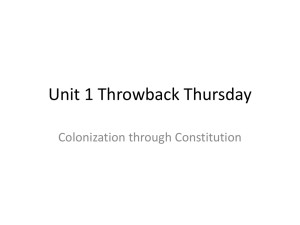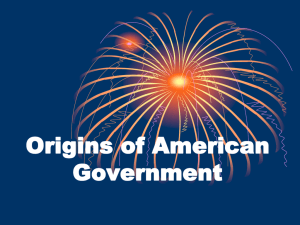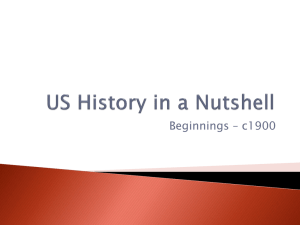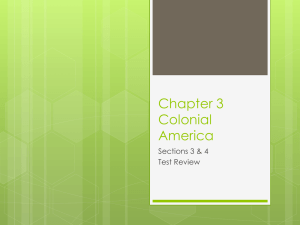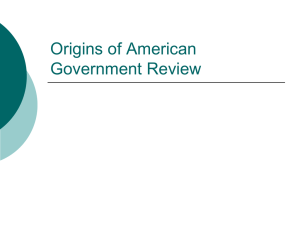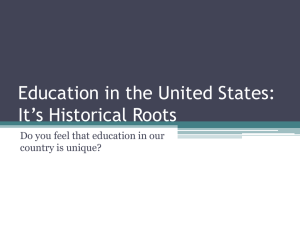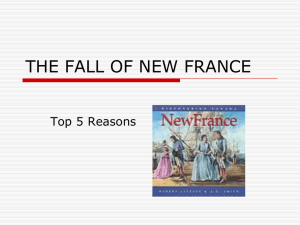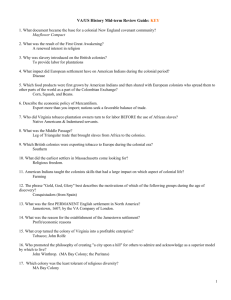U. S. History Vocabulary Study Guide Chapter One archaeology
advertisement
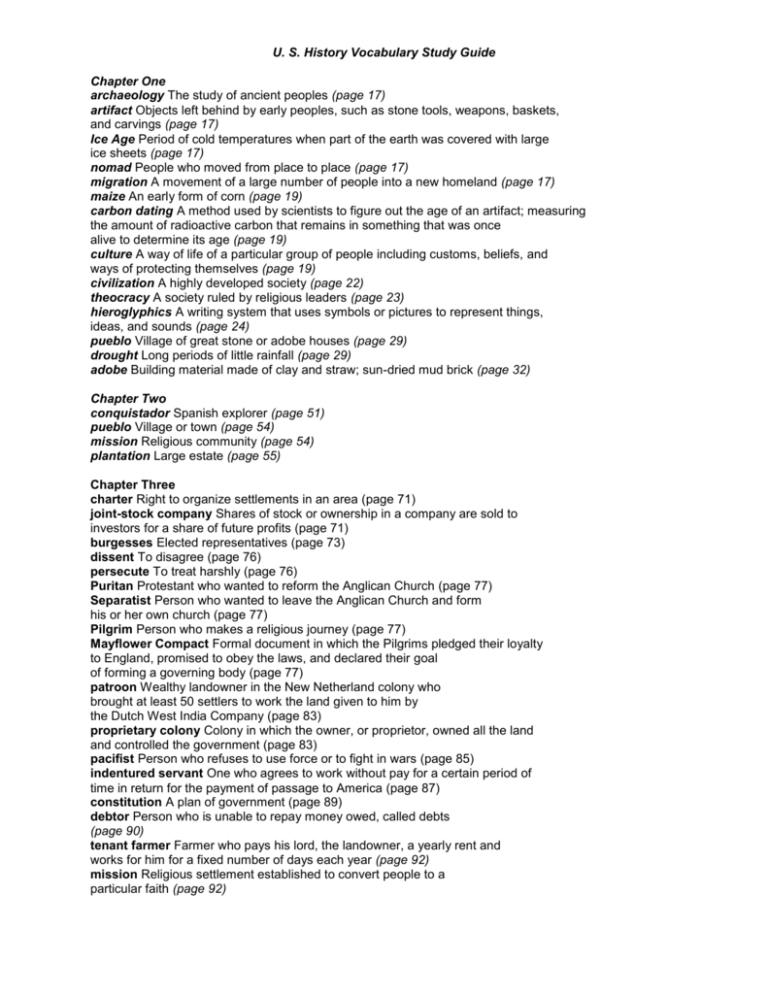
U. S. History Vocabulary Study Guide Chapter One archaeology The study of ancient peoples (page 17) artifact Objects left behind by early peoples, such as stone tools, weapons, baskets, and carvings (page 17) Ice Age Period of cold temperatures when part of the earth was covered with large ice sheets (page 17) nomad People who moved from place to place (page 17) migration A movement of a large number of people into a new homeland (page 17) maize An early form of corn (page 19) carbon dating A method used by scientists to figure out the age of an artifact; measuring the amount of radioactive carbon that remains in something that was once alive to determine its age (page 19) culture A way of life of a particular group of people including customs, beliefs, and ways of protecting themselves (page 19) civilization A highly developed society (page 22) theocracy A society ruled by religious leaders (page 23) hieroglyphics A writing system that uses symbols or pictures to represent things, ideas, and sounds (page 24) pueblo Village of great stone or adobe houses (page 29) drought Long periods of little rainfall (page 29) adobe Building material made of clay and straw; sun-dried mud brick (page 32) Chapter Two conquistador Spanish explorer (page 51) pueblo Village or town (page 54) mission Religious community (page 54) plantation Large estate (page 55) Chapter Three charter Right to organize settlements in an area (page 71) joint-stock company Shares of stock or ownership in a company are sold to investors for a share of future profits (page 71) burgesses Elected representatives (page 73) dissent To disagree (page 76) persecute To treat harshly (page 76) Puritan Protestant who wanted to reform the Anglican Church (page 77) Separatist Person who wanted to leave the Anglican Church and form his or her own church (page 77) Pilgrim Person who makes a religious journey (page 77) Mayflower Compact Formal document in which the Pilgrims pledged their loyalty to England, promised to obey the laws, and declared their goal of forming a governing body (page 77) patroon Wealthy landowner in the New Netherland colony who brought at least 50 settlers to work the land given to him by the Dutch West India Company (page 83) proprietary colony Colony in which the owner, or proprietor, owned all the land and controlled the government (page 83) pacifist Person who refuses to use force or to fight in wars (page 85) indentured servant One who agrees to work without pay for a certain period of time in return for the payment of passage to America (page 87) constitution A plan of government (page 89) debtor Person who is unable to repay money owed, called debts (page 90) tenant farmer Farmer who pays his lord, the landowner, a yearly rent and works for him for a fixed number of days each year (page 92) mission Religious settlement established to convert people to a particular faith (page 92) Chapter Four subsistence farming Farming to produce enough food to meet the needs of a family, with little left over to sell or exchange (page 101) triangular trade Merchant shipping routes that follow a triangle between the West Indies, New England Colonies, and West Africa (page 102) cash crop Crops that are sold for profit (page 103) diversity Cultural variety (page 104) Tidewater A region of flat, low-lying plains along the seacoast (page 105) backcountry Region of hills and forests west of the Tidewater (page 105) overseer Boss in charge of slaves on a plantation (page 106) mercantilism Theory that states that, when a nation’s trade grows, its gold reserves increase, and the nation becomes more powerful (page 109) export To sell to another country (page 109) import To buy from a foreign market (page 109) smuggling To trade illegally (page 109) charter colony Colonies established by settlers who were given a grant of rights and privileges (page 110) proprietary colony Colonies governed by individuals or groups to whom the land had been given by England’s king (page 111) royal colony Colonies ruled directly by Britain (page 111) apprentice Learning assistants to craft workers who taught them a trade (page 112) Iroquois Confederacy A powerful group of Native Americans formed in 1570 and based in New York (page 117) militia A group of civilians trained to fight in emergencies (page 118) speculator An investor who buys shares of a company to make a profit (page 125) Chapter Five revenue Incoming money (page 133) writs of assistance Legal documents that allowed customs officers to search homes and warehouses (page 133) resolution A formal expression of opinion (page 134) effigy A life-size rag figure representing a hated person (page 134) boycott To refuse to buy, use, or have dealings with (page 134) nonimportation Not to buy or use imported goods (page 134) repeal To cancel or officially withdraw (page 134) propaganda Information designed to influence opinion (page 137) committee of correspondence An organization used to circulate writings about colonists’ grievances against Britain (page 137) militia Groups of citizen soldiers (page 142) minutemen Militia companies, or citizen soldiers, ready to fight on a minute’s notice (page 142) Loyalists Those colonists who decided to support Britain (page 145) Patriots Colonists determined to fight against Britain for American independence (page 145) petition Formal request (page 148) preamble Introduction to the Declaration of Independence (page 151) Chapter Six neutral Taking neither side (page 163) mercenary Hired soldiers (page 164) recruit To enlist (page 165) desert To leave without permission (page 173) inflation An increase in money supply causes the price of goods to rise (page 175) blockade To close off cities and ports with ships (page 179) privateer Privately owned merchant ships equipped with weapons (page 179) guerrilla warfare A small band of soldiers appears suddenly, attacks, and disappears (page 180) ambush A surprise attack (page 187) Chapter Seven constitution A plan of government (page 193) bicameral A two-house legislature (page 193) republic A government in which citizens rule through elected representatives (page 193) petition To make a formal written request (page 196) Enlightenment Movement of the 1700s that promoted knowledge, reason, and science as means to improve society (page 208) federalism Sharing power between federal and state governments (page 208) article Part of the Constitution (page 209) legislative branch Lawmaking branch of the government (page 209) executive branch Branch of government headed by the president that carries out laws and policies (page 210) Electoral College Special group of presidential electors (page 210) judicial branch Court system that enforces the laws (page 210) checks and balances The roles the three branches of government have to ensure that no single branch can dominate the government (page 210) ratify To approve (page 211) Federalist Supporters of the new constitution (page 211) Antifederalist Those who opposed ratifying the new constitution (page 212) amendment Something added to a legal document (page 213) Chapter Eight precedent An established tradition (page 259) cabinet The Attorney General and department heads who serve as advisers to the president (page 259) national debt Amount of money the national government owed (page 260) bond Paper notes promising to repay money in a certain amount of time (page 261) speculator People who risk money in order to make a larger profit (page 261) unconstitutional Not provided for under the terms of the Constitution (page 262) tariff A tax on imports (page 262) neutrality Not taking sides in a conflict (page 265) impressment The act of forcing men into military service (page 265) partisan Favoring one side of an issue (page 268) implied powers Powers that were not specifically mentioned in the Constitution (page 268) alien Immigrants living in a country who are not citizens (page 271) Chapter Nine laissez-faire A French term meaning “let the people do as they choose”; a government that plays only a small part in the economic concerns of a country (page 279) customs duties Taxes on foreign imported goods (page 280) Conestoga wagon Sturdy vehicle topped with white canvas (page 283) secede To withdraw (page 285} tribute Protection money (page 289) neutral rights The right to sail the seas and not take sides (page 290) impressment Forcing men into military service against their wishes (page 290) embargo An act that prohibits trade with another country (page 290) War Hawks Young Republicans elected to Congress in 1810 who wanted to declare war on Britain (page 293) nationalism Patriotism or the devotion to one’s country (page 293) privateer Armed private ship (page 297) Chapter Ten Industrial Revolution A new way of working and producing goods (page 307) capital Money invested to start new businesses (page 308) technology Scientific discoveries that simplify work (page 308) cotton gin A machine that removes cotton seeds from the fiber (page 308) patent A law that gives an inventor the sole legal right to the invention and its profits for a certain period of time (page 308) factory system A system bringing manufacturing steps together in one place to increase efficiency (page 309) interchangeable parts Large amounts of uniform pieces that can replace any other identical pieces (page 309) census The official count of the population (page 314) turnpike Roads on which travelers pay a toll, or fee (page 315) canal An artificial waterway (page 317) lock Separate compartments where water levels were raised or lowered (page 31 Chapter Eleven majority More than half the votes (page 335) mudslinging Attempts to ruin opponent’s reputation with insults (page 336) landslide An overwhelming victory (page 336) suffrage The right to vote (page 337) spoils system The practice of replacing government employees with the winning candidate’s supporters (page 337) tariff A fee paid by the merchants who imported goods (page 338) nullify To cancel (page 338) secede To break away from the United States and form a separate government (page 338) Chapter Twelve joint occupation The agreement allowing both the United States and Britain to settle in the Oregon territory (page 357) mountain man A person who spends most of his time in the mountains (page 357) emigrant People who leave the United States to live in another country (page 358) Manifest Destiny The idea that the United States had a special purpose to extend its boundaries from the Atlantic Ocean to the Pacific Ocean (page 360) forty-niners The miners who arrived in California in 1849 (page 375) boomtown A new community that developed extremely quickly to accommodate the people of the gold rush (page 376) vigilantes Citizens who took the law into their own hands, acting as police, judge, jury, and possibly executioner (page 377)



